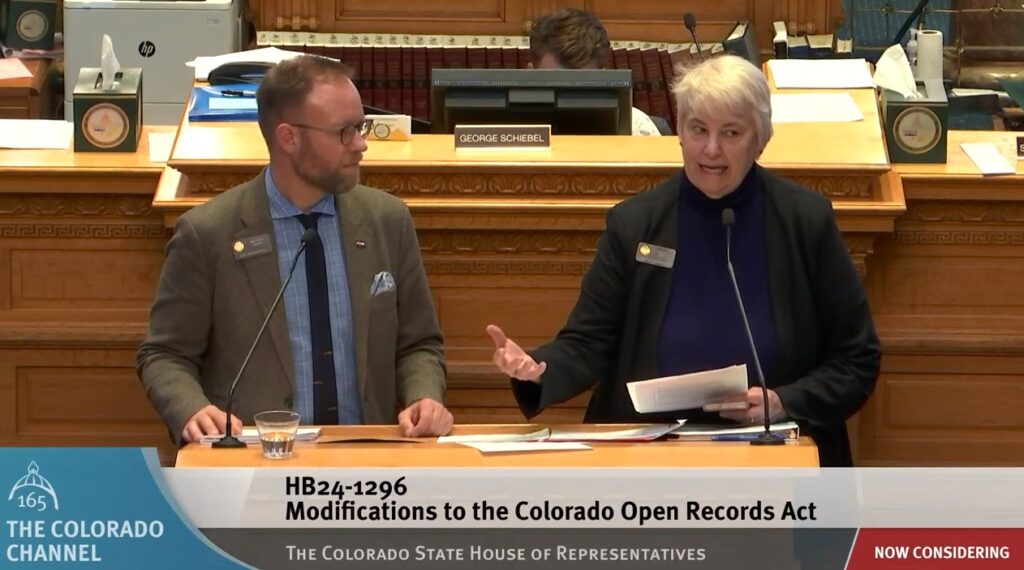By Jeffrey A. Roberts
CFOIC Executive Director
A bill in the Colorado legislature aimed at curbing the “abuse of CORA” no longer contains a provision for labeling certain requesters of public records as “vexatious.”
Representatives removed the controversial language from House Bill 24-1296 on Friday after Rep. David Ortiz argued it was “problematic” for people with disabilities and others who use the Colorado Open Records Act to fight for their rights in court.
CORA “is really how we go after getting information to try and litigate our rights, and we don’t want to be able to be declared vexatious as a roadblock,” said the Littleton Democrat, who was paralyzed from the waist down in a helicopter crash while serving as a U.S. Army pilot in Afghanistan.
As amended in committee last month, the bill would have let records custodians apply for a court order limiting someone’s access to public records for 30 working days if that person demonstrated “an intent to annoy or harass a custodian.” That person would have been considered vexatious for three years.

“They could try and declare us vexatious 100 times and we could win 99 out of 100 times. But the instance they win once, that eliminates our ability to go after this information to secure our basic rights,” Ortiz said during debate on the House floor.
As passed by the House on Saturday on a 38-24 vote, HB 24-1296 still lengthens the response deadlines in CORA to rein in what sponsoring Rep. Cathy Kipp, D-Fort Collins, has described as the “abuse of CORA” experienced by governmental agencies “already stretched pretty thin.”
On Friday, she blamed an increase in CORA requests since the COVID-19 pandemic on “urban myths and legends and information that people, frankly, are going looking for by submitting CORA requests to government.”
“And it’s really created a huge burden on our governmental entities,” Kipp said. “The whole reason behind this bill is not to deny anybody information, but to allow those governmental entities that have to fulfill CORA requests a little more breathing room.”
HB 24-1296 gives records custodians five working days, rather than CORA’s current deadline of three working days, to comply with records requests, and an additional 10 working days, rather than seven, if “extenuating circumstances” apply. The current deadlines would remain in place for requests made by the news media, as defined in Colorado’s reporter’s shield law.
The measure establishes a new extenuating circumstance, extending the response period an extra 10 working days when “the custodian, or a person who is essential to the process of responding to requests, is not scheduled to work within all or part of the five-day period.” It also allows a records custodian to treat multiple CORA requests made by the same person within 14 days as one request — ensuring the requester gets only one free hour before “research and retrieval” charges kick in.
Other provisions of HB 24-1296:
- Let records custodians take 30 working days to provide records to someone who plans to use the documents “for the direct solicitation of business or pecuniary gain” and recover “the full cost of associated with responding” to such a request. A requester could appeal the custodian’s determination in district court.
- Make confidential a government employee’s calendar “that is kept and maintained primarily pursuant to the employee’s employment,” except for the calendars of elected officials or “employees in leadership positions.” Such records, however, would be available to journalists.
- Require government entities to post information on their websites about how members of the public can request public records.
Legislators added a provision during second reading Friday requiring members of the General Assembly to “retain public records,” as defined in CORA, for a minimum of 60 days. This presumably is meant to address criticisms from the Colorado Freedom of Information Coalition and others about Senate Bill 24-157, the recently enacted measure that lets lawmakers communicate by email and text message without it being a “meeting” subject to the requirements of the Colorado Open Meetings Law.
Those communications are still subject to CORA. However, CORA excludes from the definition of public records “[a]ll documents prepared or assembled by a member of the general assembly relating to the drafting of bills or amendments.” The retention period of 60 days wouldn’t apply to communications lawmakers designate as “work product” because those communications aren’t considered “public records” under the law.
CFOIC opposes the additional obstacles created by HB 24-1296, especially when exorbitant fees already can be a significant barrier to obtaining public records. Because of an inflation factor built into CORA since 2014, state and local government entities starting July 1 will be allowed to charge an hourly rate to process requests that likely exceeds $40 after providing the first hour at no charge, up from the current maximum rate of $33.58.
The bill now goes to the Senate.
Follow the Colorado Freedom of Information Coalition on X (formerly Twitter) @CoFOIC. Like CFOIC’s Facebook page. Do you appreciate the information and resources provided by CFOIC? Please consider making a tax-deductible donation.




